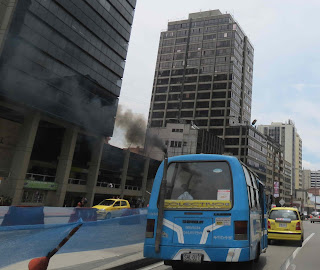 |
| Expensive vehicles block a street in the ritzy La Merced neighborhood. Do they deserve fuel subsidies? |
Pick the most important: Cheap potatoes, shoes, light bulbs or gasoline?
 |
| Doesn't fruit deserve subsidies? |
And that's turning a well-advised policy of stabilizing gasoline prices into a subsidy. According to El Espectador, Colombia's gasoline price stabilization fund is 3 trillion pesos in the red - and that was last month. Since they didn't raise the price of gasoline this month and inflation marched ahead, the deficit must have grown.
Subsidizing gasoline, which pollutes and causes global warming, generates traffic jams, is often used frivolously, and is consumed disproportionately by the wealthy, makes little sense, environmentally, economically or in terms of quality of life. But it is popular.
 |
| Those evil multinationals. But let's subsidize them! |
And that was back in 2005, when Venezuelan gasoline still cost a few cents per gallon. Since then, Venezuela's inflation has galloped along, while the price of Venezuelan gasoline has stayed fixed, slashing the price even further.
Besides damaging the environment and quality of life, Venezuela's almost-free gasoline is also sinking
 |
| A mural on the National University campus in Bogotá calls for cheaper fuel. Would they volunteer to give away university infrastructure funds? |
Colombia is, thankfully, still a long way from Venezuela's disastrous gasoline policy. But I suspect that Venezuela also started a few decades ago out with a tiny gasoline subsidy intended to buy votes - and then got scared of raising prices. Decades later, gasoline's still free, the government is hemorraging money, and politicians are terrified of raising prices.
Colombia's policy is supposed to be to sell its oil and gasoline at world prices. Perhaps that
 |
| The National University is renovating its old engineering building. Is cheap gasoline more important? |
The International Monetary Fund recently issued a report about global gasoline subsidies, finding that such subsidies are give-aways to the rich, who get six times as much of the subsidy per-capita than do poor people.
 |
| A bus spouts fumes on Carrera Septima. Does it deserve subsidies? |
Imagine how it warms the hearts of executives at CEMEX, Bavaria and Coca Cola companies - all foreign owned - to know that leftist, anti-globalization students at La Nacho are calling for subsidized fuel for these companies' trucks and factories.
And, do these leftist street artists really trust big corporations to pass their savings onto their poor customers instead of pocketing bigger profits?
Update: The Wall Street Journal has a long, really damning article about Venezuela's gasoline subsidy, which has pushed the price of gasoline there down to 0.4 U.S. cents per liter!
The most damning points:
* Veneuzela's per-capita gasoline consumption is six times that of Colombia! And, since in both countries most people do not own cars, the ones hogging that subsidy are the monied classes.
*The International Energy Agency estimates that the subsidy cost Venezuela $27 million in 2011, or 8.6% of its gross domestic product. In comparison, Venezuela spent 3.25% of GDP on health care and 5.1% on education.
It's stealing from the poor to give to the rich!
By Mike Ceaser, of Bogotá Bike Tours




5 comments:
Excellent post Miguel, you nailed it again.
yeah, very good
Thanks Mauricio and Ally. Unfortunately, I suspect that we're in a minority.
Saludos,
Mike
Well the answer is really simple: those people don't think, I mean, the don't think about the consequences of what they're asking for and the main reason why economics are so misunderstood; people chose to believe instead of analyse, so they believe we should have the same policies from Venezuela without realizing the disastrous effects. the same goes to minimun salaries, pension ages, interest rates... almost anything with numbers involved.
But I must clarify something, some people chose not to see deliberately, like senator Velasco who insists on lowering the price although he knows perfectly the consequences.
Hi Carlito,
You're very right. People see the immediate 'benefit' (cheap gas), but the costs are less direct and less easy to see. On the other hand, the politicians know what's going on, but find it convenient to be populists.
Mike
Post a Comment